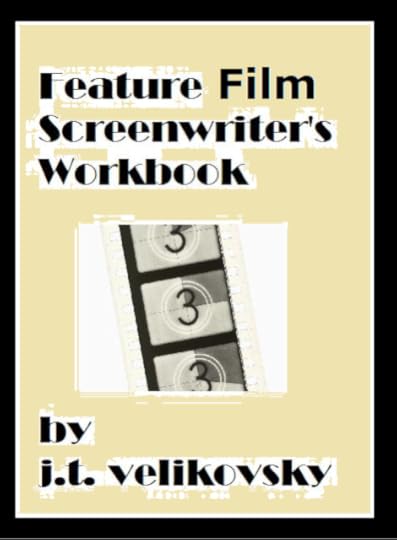A Short Story Recipe
A Short Story Recipe (or: Template or Algorithm or - [gasp] - Formula)by JTV
So, some will know I like studying (sometimes even, being the first in the universe to identify) patterns in things. Like, in stories, songs, movies, books, artworks, whatever.
e.g. See my collection of movie-story element patterns, in this book:
 The Feature Film Screenwriters' Workbook
(Velikovsky 1995, 2011)
The Feature Film Screenwriters' Workbook
(Velikovsky 1995, 2011)
And see: https://storyality.wordpress.com/2012/12/17/storyality-28-screenwriting-manuals-since-1913/ And see my (2016) PhD for much more. Also see this: The StoryAlity Screenplay Syntagm
Also some of my stuff is in this (great) book:

StoryAlity #126 – Miller’s Compendium of Timeless Tools for the Modern Writer (2015)
Anyway; I digress. Just trying to demonstrate that I like: recipes, algorithms, patterns.
Also... I like writing haikus. (See some of my: Horrifying Haikus )
Anyway - be all that as it may.
I think, we've all got to ask ourselves:
Why are the (classic) James Bond plots so formulaic?
Why are, the (classic) Agatha Christie stories?
Why are, the (classic) Sherlock Holmes stories?
Also, why do these things sell so well? Why so canon, and not, so archive?There's one random answer here, (that pretty much, applies) - but that's another story.
What I am really trying to get at here, is: formulas (I like to call 'em algorithms) for short stories.
Okay - some more background, before I get to the point.
In the domain of Short Stories, there's a `classic' (i.e., recognizable, characteristic) algorithm for certain kinds of clearly-identifiable:
O. Henry `twist' stories...
Roald Dahl `twist' stories...
Phillip K Dick `mindbender' stories
Jorges Luis Borges mindblower-philosophy stories
Edgar Allen Poe spooky stories (aka "weird tales", aka Cosmic Horror)
H P Lovecraft stories
Aesop's Fables stories
The Exploits of the Incomparable Mulla Nasrudin (aka Nasreddin) stories
Franz Kafka stories...
(and - there are also many others, but you get the idea...)
By contrast - I also want to point out that Tolstoy doesn't really have an identifiable style/voice/form/format/formula/algorithm, in his short stories... (At least, not as much as the others above, do) ...He seemed to: mix it up a lot. (I am also not suggesting: that's either good or bad. It is what it is.)
I also just want to note, the 7-word microstory El Dinosaurio: "When he awoke, the dinosaur was still there." (Monterroso, 1959). (I feel this cosmic horror every day I wake up and Trump is still Prez of the US.) I also do not want to note, the apocryphal Hemingway 6-word story, For Sale, but I just did. It's not important.
Okay so - with all that in mind, I've randomly come up with a template (recipe, algorithm) for a certain kind of short story (flash fiction). Here it is.All of this stuff, needs to be in <1000 words.
[STORY TITLE HERE] (has to be: 3 words)
1) Story opens with a question (Could well be: a Philosophical Q, but, doesn't have to be that). Then the 2nd sentence somehow sums up, the whole story (but - without giving away the ending, or the twist).2) Then, it has a visual metaphor for the whole story. (This is integrated into the following, ie 3); and shouldn't seem: arbitrary/shoehorned in there.) 3) Establishes the: Setting, the Character(s) and their Problem/s...4) Character/s attempted Solution (of the problem/s) [...this part could take some time]5) Mind-blowing (also: mind-bending) End Twist.
Also, it has to change your life. By: changing your mind (by: blowing it).Also, it has to be super-engaging. (Slow & boring is a no-go.)I note: It doesn't need to be about: Characters who Change. (See my PhD, for why: that's never important. Character + Problem + Attempted Solution is all that matters.)
So...Why, the above recipe? Because: there's too many conventional short stories, and they're getting old now? That old algorithm is pretty worn out. I want a short story to be worth my time reading it... A yuge: Benefit/Cost ratio.
Ok and so, I'm going to write some flash fiction, according to this schema. And see what happens....Let's see how it goes...
The idea is: to create a recognizable style/format/voice/algorithm within the Genre.
P.S. - Oh, and (the recipe/algorithm) it starts with a Question (#1), because of: Classic Writing style. Hooks you right in...
PPS - Some of my fave sci-fi short stories. (But I forgot to mention The Dinosaurs by Italo Calvino, from his Cosmicomics. I heart that story.)
-----------------------------
Dr. Joe T. Velikovsky, Ph.D. (Communication & Media Arts)
-------------------
`The word communication will be used here in a very broad sense to include all of the procedures by which one mind may affect another. This, of course, involves not only written and oral speech, but also music, the pictorial arts, the theater, the ballet, and in fact all human behavior... The language of this memorandum will often appear to refer to the special, but still very broad and important, field of the communication of speech; but practically everything said applies equally well to music of any sort, and to still or moving pictures, as in television." - The Mathematical Theory of Communication, (Shannon & Weaver 1949, pp. 3-4).
Also:
“I know you think you understand what you thought I said, but I'm not sure you realize that what you heard is not what I meant” - (attributed, and ironically, possibly mistakenly, to: Robert McCloskey, namely the children's book author and illustrator, date of quote unknown)
& this autosig is not even near complete yet, as
JT Velikovsky is also a:
Transmedia Writer-Director-Producer: Movies, Games, TV, Theatre, Books, Comics
Transmedia Writing Blog: http://on-writering.blogspot.com.au/
& (High-RoI) Story/Screenplay/Movie Analyst - and Evolutionary Systems Theorist
See: https://storyality.wordpress.com/
& Bio-Culture (Science & the Arts) & Transmedia Researcher
Academia link: https://aftrs.academia.edu/JTVelikovsky
See, also:
Joe Velikovsky on IMDb:
YouTube: https://www.youtube.com/joeteevee
Okay - the autosig is over now. You can stop reading.
So, some will know I like studying (sometimes even, being the first in the universe to identify) patterns in things. Like, in stories, songs, movies, books, artworks, whatever.
e.g. See my collection of movie-story element patterns, in this book:
 The Feature Film Screenwriters' Workbook
(Velikovsky 1995, 2011)
The Feature Film Screenwriters' Workbook
(Velikovsky 1995, 2011)And see: https://storyality.wordpress.com/2012/12/17/storyality-28-screenwriting-manuals-since-1913/ And see my (2016) PhD for much more. Also see this: The StoryAlity Screenplay Syntagm
Also some of my stuff is in this (great) book:

StoryAlity #126 – Miller’s Compendium of Timeless Tools for the Modern Writer (2015)
Anyway; I digress. Just trying to demonstrate that I like: recipes, algorithms, patterns.
Also... I like writing haikus. (See some of my: Horrifying Haikus )
Anyway - be all that as it may.
I think, we've all got to ask ourselves:
Why are the (classic) James Bond plots so formulaic?
Why are, the (classic) Agatha Christie stories?
Why are, the (classic) Sherlock Holmes stories?
Also, why do these things sell so well? Why so canon, and not, so archive?There's one random answer here, (that pretty much, applies) - but that's another story.
What I am really trying to get at here, is: formulas (I like to call 'em algorithms) for short stories.
Okay - some more background, before I get to the point.
In the domain of Short Stories, there's a `classic' (i.e., recognizable, characteristic) algorithm for certain kinds of clearly-identifiable:
O. Henry `twist' stories...
Roald Dahl `twist' stories...
Phillip K Dick `mindbender' stories
Jorges Luis Borges mindblower-philosophy stories
Edgar Allen Poe spooky stories (aka "weird tales", aka Cosmic Horror)
H P Lovecraft stories
Aesop's Fables stories
The Exploits of the Incomparable Mulla Nasrudin (aka Nasreddin) stories
Franz Kafka stories...
(and - there are also many others, but you get the idea...)
By contrast - I also want to point out that Tolstoy doesn't really have an identifiable style/voice/form/format/formula/algorithm, in his short stories... (At least, not as much as the others above, do) ...He seemed to: mix it up a lot. (I am also not suggesting: that's either good or bad. It is what it is.)
I also just want to note, the 7-word microstory El Dinosaurio: "When he awoke, the dinosaur was still there." (Monterroso, 1959). (I feel this cosmic horror every day I wake up and Trump is still Prez of the US.) I also do not want to note, the apocryphal Hemingway 6-word story, For Sale, but I just did. It's not important.
Okay so - with all that in mind, I've randomly come up with a template (recipe, algorithm) for a certain kind of short story (flash fiction). Here it is.All of this stuff, needs to be in <1000 words.
[STORY TITLE HERE] (has to be: 3 words)
1) Story opens with a question (Could well be: a Philosophical Q, but, doesn't have to be that). Then the 2nd sentence somehow sums up, the whole story (but - without giving away the ending, or the twist).2) Then, it has a visual metaphor for the whole story. (This is integrated into the following, ie 3); and shouldn't seem: arbitrary/shoehorned in there.) 3) Establishes the: Setting, the Character(s) and their Problem/s...4) Character/s attempted Solution (of the problem/s) [...this part could take some time]5) Mind-blowing (also: mind-bending) End Twist.
Also, it has to change your life. By: changing your mind (by: blowing it).Also, it has to be super-engaging. (Slow & boring is a no-go.)I note: It doesn't need to be about: Characters who Change. (See my PhD, for why: that's never important. Character + Problem + Attempted Solution is all that matters.)
So...Why, the above recipe? Because: there's too many conventional short stories, and they're getting old now? That old algorithm is pretty worn out. I want a short story to be worth my time reading it... A yuge: Benefit/Cost ratio.
Ok and so, I'm going to write some flash fiction, according to this schema. And see what happens....Let's see how it goes...
The idea is: to create a recognizable style/format/voice/algorithm within the Genre.
P.S. - Oh, and (the recipe/algorithm) it starts with a Question (#1), because of: Classic Writing style. Hooks you right in...
PPS - Some of my fave sci-fi short stories. (But I forgot to mention The Dinosaurs by Italo Calvino, from his Cosmicomics. I heart that story.)
-----------------------------
Dr. Joe T. Velikovsky, Ph.D. (Communication & Media Arts)
-------------------
`The word communication will be used here in a very broad sense to include all of the procedures by which one mind may affect another. This, of course, involves not only written and oral speech, but also music, the pictorial arts, the theater, the ballet, and in fact all human behavior... The language of this memorandum will often appear to refer to the special, but still very broad and important, field of the communication of speech; but practically everything said applies equally well to music of any sort, and to still or moving pictures, as in television." - The Mathematical Theory of Communication, (Shannon & Weaver 1949, pp. 3-4).
Also:
“I know you think you understand what you thought I said, but I'm not sure you realize that what you heard is not what I meant” - (attributed, and ironically, possibly mistakenly, to: Robert McCloskey, namely the children's book author and illustrator, date of quote unknown)
& this autosig is not even near complete yet, as
JT Velikovsky is also a:
Transmedia Writer-Director-Producer: Movies, Games, TV, Theatre, Books, Comics
Transmedia Writing Blog: http://on-writering.blogspot.com.au/
& (High-RoI) Story/Screenplay/Movie Analyst - and Evolutionary Systems Theorist
See: https://storyality.wordpress.com/
& Bio-Culture (Science & the Arts) & Transmedia Researcher
Academia link: https://aftrs.academia.edu/JTVelikovsky
See, also:
Joe Velikovsky on IMDb:
YouTube: https://www.youtube.com/joeteevee
Okay - the autosig is over now. You can stop reading.
Published on August 10, 2019 08:53
No comments have been added yet.



